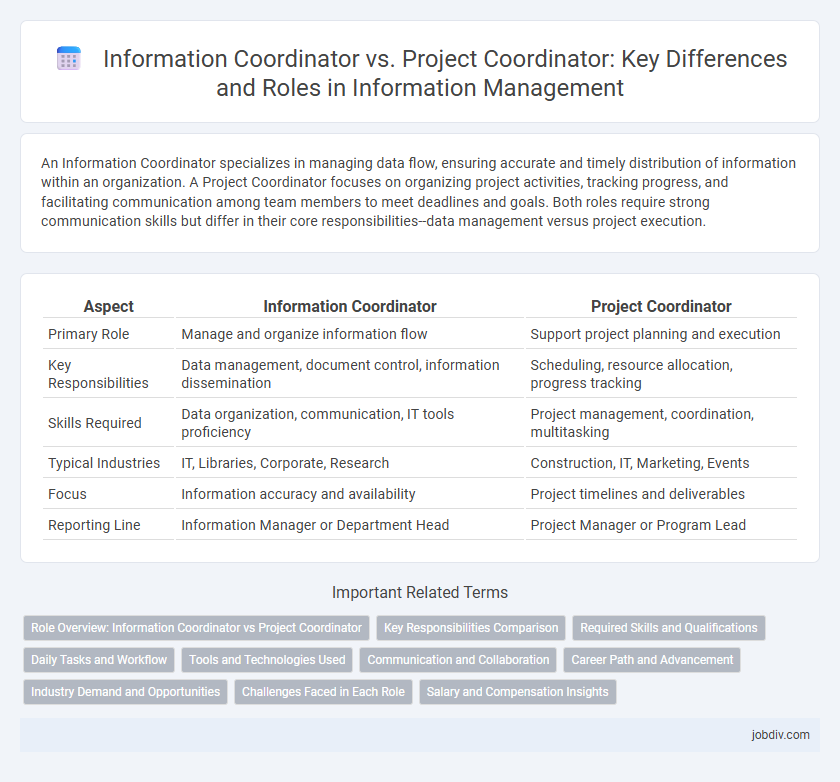An Information Coordinator specializes in managing data flow, ensuring accurate and timely distribution of information within an organization. A Project Coordinator focuses on organizing project activities, tracking progress, and facilitating communication among team members to meet deadlines and goals. Both roles require strong communication skills but differ in their core responsibilities--data management versus project execution.
Table of Comparison
| Aspect | Information Coordinator | Project Coordinator |
|---|---|---|
| Primary Role | Manage and organize information flow | Support project planning and execution |
| Key Responsibilities | Data management, document control, information dissemination | Scheduling, resource allocation, progress tracking |
| Skills Required | Data organization, communication, IT tools proficiency | Project management, coordination, multitasking |
| Typical Industries | IT, Libraries, Corporate, Research | Construction, IT, Marketing, Events |
| Focus | Information accuracy and availability | Project timelines and deliverables |
| Reporting Line | Information Manager or Department Head | Project Manager or Program Lead |
Role Overview: Information Coordinator vs Project Coordinator
An Information Coordinator manages data flow, ensuring accurate collection, organization, and dissemination of information across departments to support decision-making processes. A Project Coordinator oversees project timelines, resource allocation, and communication among team members to ensure project objectives are met efficiently. While the Information Coordinator emphasizes information accuracy and accessibility, the Project Coordinator focuses on project execution and stakeholder coordination.
Key Responsibilities Comparison
Information Coordinators manage data flow, maintain information systems, and ensure data accuracy to support organizational decision-making. Project Coordinators oversee project schedules, resource allocation, and communication among team members to ensure timely delivery of project milestones. Both roles require strong organizational skills, but Information Coordinators focus on data integrity while Project Coordinators emphasize project execution and team coordination.
Required Skills and Qualifications
Information Coordinators require expertise in data management, information systems, and strong analytical abilities to ensure accurate handling and dissemination of organizational data. Project Coordinators must possess skills in project planning, scheduling, resource allocation, and effective communication to oversee project execution and team coordination. Both roles benefit from proficiency in software tools relevant to their functions, but Information Coordinators emphasize technical data skills while Project Coordinators focus on organizational and leadership capabilities.
Daily Tasks and Workflow
An Information Coordinator manages data flow by organizing, updating, and maintaining databases, ensuring accurate information retrieval and security. A Project Coordinator oversees schedules, resources, and communication among team members to keep projects on track and meet deadlines. Daily tasks of an Information Coordinator focus on data accuracy and system updates, while a Project Coordinator emphasizes task assignment, progress monitoring, and stakeholder reporting.
Tools and Technologies Used
Information Coordinators primarily utilize data management systems, content management software, and analytics tools like Microsoft SharePoint and Tableau to organize and analyze information effectively. Project Coordinators rely on project management platforms such as Asana, Trello, and Microsoft Project to plan, schedule, and track project tasks and milestones. Both roles benefit from communication tools like Slack and Microsoft Teams, but their core software reflects their distinct focus on data versus project workflows.
Communication and Collaboration
Information Coordinators specialize in managing data flow and ensuring accurate communication between departments, optimizing information sharing platforms for seamless collaboration. Project Coordinators focus on coordinating team efforts, timelines, and resources, facilitating clear communication channels to align project goals and enhance collaborative productivity. Both roles require strong interpersonal skills, but Information Coordinators emphasize data management whereas Project Coordinators prioritize task coordination and stakeholder engagement.
Career Path and Advancement
Information Coordinators typically focus on managing data flow, documentation, and communication within organizations, laying a foundation for roles in information management or data analysis. Project Coordinators oversee project timelines, resource allocation, and team collaboration, often advancing to project management or operations leadership positions. Career advancement for Information Coordinators involves specialization in data governance or IT systems, while Project Coordinators may transition into senior project management or program director roles.
Industry Demand and Opportunities
Information Coordinators are increasingly in demand within data-driven industries, managing data flow and ensuring accurate information dissemination, while Project Coordinators focus on organizing resources and timelines across various sectors. The technology and healthcare industries particularly seek Information Coordinators to handle complex data systems and compliance requirements. Project Coordinators find broad opportunities in construction, marketing, and engineering, where effective project management directly impacts operational success.
Challenges Faced in Each Role
Information Coordinators face challenges in managing data accuracy, ensuring secure information flow, and aligning communication strategies across departments. Project Coordinators struggle with balancing timelines, resource allocation, and adapting to changing project scopes while maintaining stakeholder engagement. Both roles demand strong organizational skills but encounter distinct obstacles tied to their specialized responsibilities.
Salary and Compensation Insights
Information Coordinators typically earn an average salary ranging from $55,000 to $70,000 annually, while Project Coordinators often have a slightly broader range, earning between $50,000 and $75,000 depending on industry and experience. Compensation packages for Project Coordinators may include performance bonuses and profit-sharing incentives, reflecting their role in managing project deliverables and timelines. Salary variations for Information Coordinators often depend on technical expertise and the ability to manage data systems critical to organizational communication and records.
Information Coordinator vs Project Coordinator Infographic

 jobdiv.com
jobdiv.com